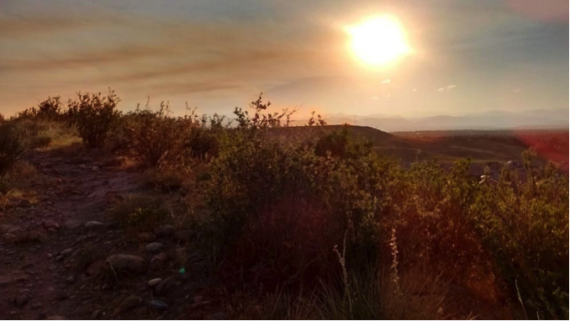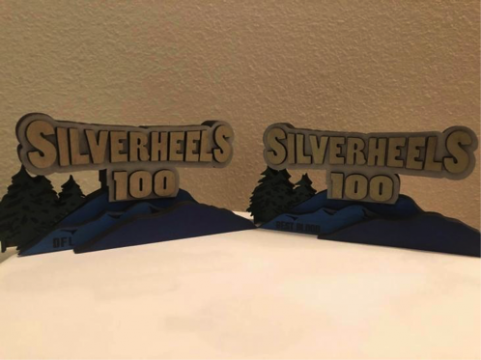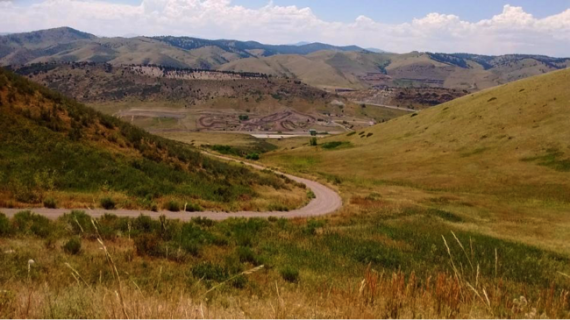By Staff Columnist Holly Rapp
For most of my years as a runner, I avoided races and group runs because I was afraid of being last. As someone who isn’t even remotely competitive, these concerns made little sense. And looking back now, worrying about being last appears silly and wholly insignificant. But it took a considerable amount of time to develop this perspective, and even longer to figure out the real reasons behind my apprehensions. So here are some thoughts on being last from someone who has frequently occupied that position.
To be clear: this isn’t a triumphant narrative in which I found out I am really fast and never actually finished last. Rather, this is a story of how I started running with others, finished last more times than I can count, and found out being last isn’t really that terrible. The experience of finishing last so frequently caused me to change completely my perspective on the significance of last place.
It’s a rather long story, so here are the most important points: being last only matters if you decide it matters, it’s not as bad as you think it is, and it can teach you a lot about patience, perseverance, and persistence. If fear of being last is stopping you from taking on a race or other running experience, I hope this piece might encourage you to reframe your thinking on what it really means to be last.
***
Let me start with the setting. Shortly after moving to Denver, I saw a sign for a nearby park. My husband and I soon found ourselves at the Bluffs Regional Park, a beautiful trail near our home.
Upon entering the Bluffs, this lifelong Midwestern girl was startled to see what appeared to be a mountain. When I saw a path winding up to the top of the alleged mountain (it’s actually only a tiny hill), I asked incredulously if we were going up there. My husband, a Colorado native, chuckled and started leading me up the first of many hills. At some point, as I was walking up one of the seemingly endless climbs, a runner flew by me. I stopped dead in my tracks and stared for a moment before saying something elegant like “Who the hell can run here?!?”
***
Several months later, I was intensely lonely and struggling to find my place in Colorado, an area so radically different than the small-town Midwest I knew. Throughout this difficult period, the one thing I held onto was running. I had never lived in a place with so many trails and I spent my days exploring my new surroundings. I was, however, adjusting quite poorly to the altitude and hilly terrain. As a result, I sought out only the flattest routes, avoiding fastidiously even the slightest of inclines. My pace remained glacial at best.
***
One day while buying shoes at a local running store, I saw a sign for a running group. In a very out-of- character move, I inquired about the group. In particular, I asked if runners of the advertised “all paces” actually attended. Though the friendly store associate assured me there would be runners of all abilities, I had the distinct feeling I would be the slowest.
Several weeks later, I finally worked up the courage to attend. From the moment I walked into the store, I felt I had made a terrible mistake. There were only a few other runners, all of whom looked extremely fit and fast. It only got better when they explained cheerfully that we would be running the Bluffs – the infamous “mountain” from my early Denver hike.
It was too late to back out so I slowly walked out the door and wondered how exactly one goes about running up a hill. The other runners were gone so quickly I couldn’t see them within moments of leaving the store. My curiosity about hills was quickly sated when I reached the first climb and made it ten steps before slowing abruptly to a walk. It turns out hills hurt. Right after I learned I couldn’t run uphill, I found out I couldn’t run downhill, either.
I returned to the store completely spent. The other runners had been back for some time and were chatting and drinking beer, looking like they hadn’t even run. I was sweaty and red faced, my legs still shaking from my first hill-running attempt. As I pondered this striking contrast between myself and the rest of the group, I realized my deepest fears – that I would be the slowest, the most out of shape, the worst runner there – in a word, last – had all come true.
In that moment, I asked myself an important question: so what? I was the clearly the slowest, but what had happened? Nothing, it turns out. The other runners asked how it was and I answered honestly that the hills had nearly killed me. They laughed and gave me knowing smiles while saying some encouraging things. As we talked, I realized the embarrassment, judgment, and shame I assumed would necessarily come with being last had never materialized.

So I kept showing up. Though I was always the slowest, usually so far back I couldn’t see another runner, I knew it didn’t matter unless I decided it did. It was a simple fact that someone would always be last. And, if I wasn’t willing to be that person, I would never get better.
***
Now a few years past that first group run, I have added races to my list of running ventures. While researching ultramarathons, a current favorite pastime, I was surprised to learn that some offer special awards for the last place finisher. It turns out that last place, the position I dreaded for so long, is reason for celebration at certain events. The Javelina Jundred, for instance, a race from Aravapia Running, features a “Dead Last (100 Mile)” award. Human Potential races offer a similar illustrious DFL (Dead F*cking Last) prize:
Dead F*cking Last
This has long been a celebrated finishing position in the sport of ultra running. It goes to the individual whose grit and determination to finish a race saw them on the course the longest. For coming in dead last we typically offer a comp entry to a future race. We’ve also been known to up the ante with a framed award and a bottle of whiskey from time to time.

Reading this description, I knew immediately that any ultra with such a prize would be just the right environment for a runner like me. It’s a fair bet that these races focus less on fast times and competition and instead care more about creating an incredible experience for every runner on the course. In some parts of the ultrarunning community, I began to see, being last is a reason for celebration and pride, not fear or embarrassment; a marker of courage and strength, not weakness or shame.
***
To this day, I frequently finish last in group runs. And I would be lying if I said I never worry about being last. Sometimes I am embarrassed by how far I am behind the group. When I consider races with small numbers of entrants, I pause as I consider the increased statistical probability that I will be last. (In one week, in fact, I will run just such a race – an event with so few entrants for my chosen distance that I will likely finish DFL.) But the difference is that I no longer let these fears dictate my actions. I still show up. I still sign up. I know I might end up last, but I’ve decided I can live with that.
In the end, it wasn’t even really about being last – that fear was simply one of many excuses I came up with to avoid trying anything where I faced a real chance of failure. It is, after all, easy to come up with any number of reasons to shy away from truly difficult endeavours. But when I tried instead to think of every reason possible to jump in and embrace these challenges, it revolutionized my perspective and opened up an entirely new world of running. What might the same do for you?

